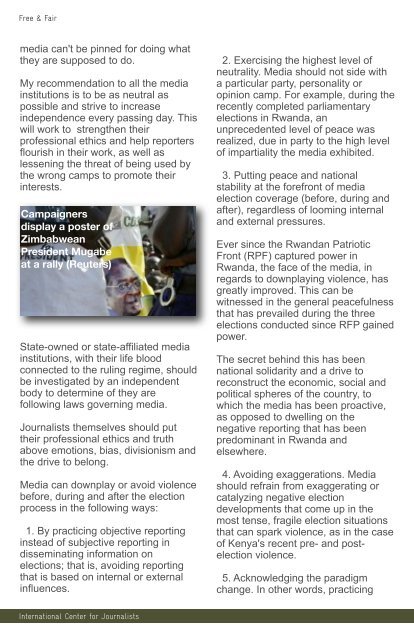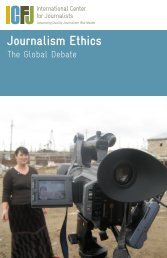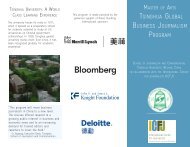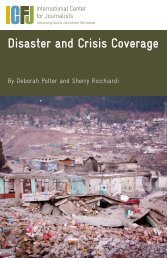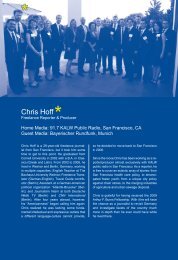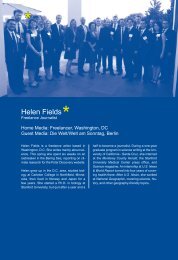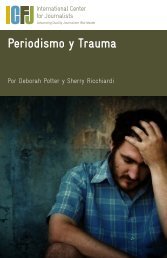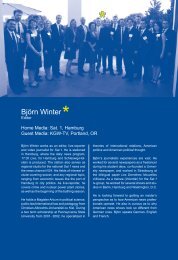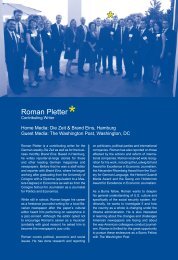Download PDF - International Center for Journalists
Download PDF - International Center for Journalists
Download PDF - International Center for Journalists
Create successful ePaper yourself
Turn your PDF publications into a flip-book with our unique Google optimized e-Paper software.
Free & Fair<br />
media can't be pinned <strong>for</strong> doing what<br />
they are supposed to do.<br />
My recommendation to all the media<br />
institutions is to be as neutral as<br />
possible and strive to increase<br />
independence every passing day. This<br />
will work to strengthen their<br />
professional ethics and help reporters<br />
flourish in their work, as well as<br />
lessening the threat of being used by<br />
the wrong camps to promote their<br />
interests.<br />
Campaigners<br />
display a poster of<br />
Zimbabwean<br />
President Mugabe<br />
at a rally (Reuters)<br />
State-owned or state-affiliated media<br />
institutions, with their life blood<br />
connected to the ruling regime, should<br />
be investigated by an independent<br />
body to determine of they are<br />
following laws governing media.<br />
<strong>Journalists</strong> themselves should put<br />
their professional ethics and truth<br />
above emotions, bias, divisionism and<br />
the drive to belong.<br />
Media can downplay or avoid violence<br />
be<strong>for</strong>e, during and after the election<br />
process in the following ways:<br />
1. By practicing objective reporting<br />
instead of subjective reporting in<br />
disseminating in<strong>for</strong>mation on<br />
elections; that is, avoiding reporting<br />
that is based on internal or external<br />
influences.<br />
2. Exercising the highest level of<br />
neutrality. Media should not side with<br />
a particular party, personality or<br />
opinion camp. For example, during the<br />
recently completed parliamentary<br />
elections in Rwanda, an<br />
unprecedented level of peace was<br />
realized, due in party to the high level<br />
of impartiality the media exhibited.<br />
3. Putting peace and national<br />
stability at the <strong>for</strong>efront of media<br />
election coverage (be<strong>for</strong>e, during and<br />
after), regardless of looming internal<br />
and external pressures.<br />
Ever since the Rwandan Patriotic<br />
Front (RPF) captured power in<br />
Rwanda, the face of the media, in<br />
regards to downplaying violence, has<br />
greatly improved. This can be<br />
witnessed in the general peacefulness<br />
that has prevailed during the three<br />
elections conducted since RFP gained<br />
power.<br />
The secret behind this has been<br />
national solidarity and a drive to<br />
reconstruct the economic, social and<br />
political spheres of the country, to<br />
which the media has been proactive,<br />
as opposed to dwelling on the<br />
negative reporting that has been<br />
predominant in Rwanda and<br />
elsewhere.<br />
4. Avoiding exaggerations. Media<br />
should refrain from exaggerating or<br />
catalyzing negative election<br />
developments that come up in the<br />
most tense, fragile election situations<br />
that can spark violence, as in the case<br />
of Kenya's recent pre- and postelection<br />
violence.<br />
5. Acknowledging the paradigm<br />
change. In other words, practicing<br />
<strong>International</strong> <strong>Center</strong> <strong>for</strong> <strong>Journalists</strong>


